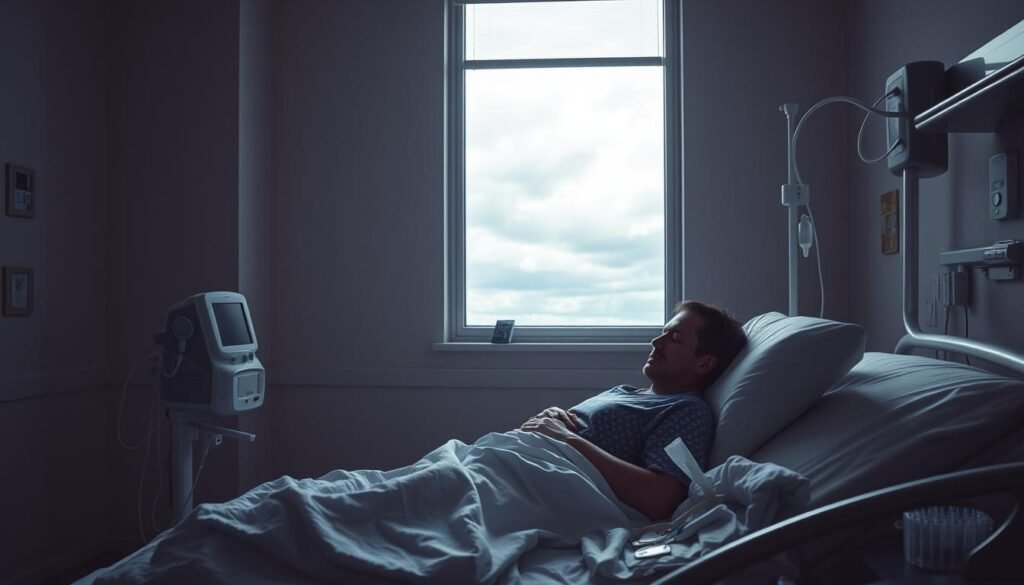Did you know that about 70-90% of people getting radiation therapy feel really tired? This tiredness is a big problem during cancer treatment. It can change how patients feel about their day-to-day life. In this guide, you’ll learn exactly what radiation fatigue feels like. You’ll see how it’s different from other cancer-related tiredness. And, you’ll understand how it affects your daily routines and feelings.
Understanding the signs and how long radiation fatigue lasts helps patients. It helps them know what to expect during their treatment. Patients can find ways to keep their energy up. This guide shines a light on the silent battles many face. It gives strength to those fighting cancer to get the help they need during radiation therapy.
Key Takeaways
- Radiation fatigue is experienced by 70-90% of patients undergoing radiation therapy.
- Fatigue often worsens as treatment progresses and can persist long after therapy ends.
- Understanding radiation therapy side effects can enhance a patient’s ability to cope with treatment.
- Fatigue should not be ignored; discussing it with healthcare providers is crucial for management.
- Patients can benefit from strategies that balance rest and activity to combat fatigue.
- Nutrition and hydration play key roles in boosting energy levels during treatment.
Understanding Radiation Fatigue
Radiation fatigue is more than just being tired. It’s a deep, constant exhaustion that hits people receiving cancer treatment. It affects your body, feelings, and thoughts. Knowing more about it helps tackle this fatigue better.
Definition and Overview
Radiation fatigue comes from the side effects of radiation therapy. Unlike normal tiredness, rest doesn’t fix it. People feel worn out and emotionally drained. This fatigue usually gets worse around the three to six-week mark of treatment. For women with early breast cancer, a specific protein increase is tied to this exhaustion.
Comparison with Other Types of Fatigue
This fatigue is not like the fatigue from a hard day. It doesn’t go away with sleep. It’s due to the stress of cancer treatment and the emotional weight of illness. Anemia and changes in your cells make it worse. Blood and breast cancers often bring on this deep tiredness. It’s critical for patients to understand these details as they go through treatment.
What Does Radiation Fatigue Feel Like
Radiation therapy fatigue is complex. It’s more than just feeling tired. This state involves both physical and emotional exhaustion. It deeply affects daily life during and after cancer treatment. Knowing about these aspects helps patients deal with cancer treatment better.
Physical and Emotional Exhaustion
Radiation therapy often leads to deep fatigue. This is not just regular tiredness. The physical side comes from the body needing energy to fix healthy tissue hurt by radiation. It also comes from the stress of medical visits. The effects of radiation therapy get stronger over time. They are most intense towards the end. Emotional tiredness shows up as feelings of despair and worry due to radiation sickness symptoms. It’s vital for patients to talk about what they’re going through. This helps their healthcare team support them better.
Impacts on Daily Activities
Radiation therapy greatly affects a patient’s daily life. Simple tasks become hard, changing how one works and handles personal duties. It helps to try different ways to manage daily life with cancer treatment fatigue. Suggestions include asking for help and changing the work setting to be more supportive. Doing fun activities helps too. It boosts energy and provides a distraction. According to research, balancing rest and some movement helps lessen fatigue. This can improve life quality during treatment.
| Time Frame | Fatigue Level | Management Strategies |
|---|---|---|
| Week 1-2 | Low to Moderate | Focus on hydration and light activity |
| Week 3-4 | Moderate to High | Rest frequently and consider assistance for daily tasks |
| Week 5-6 | High | Incorporate short naps and consult healthcare providers frequently |
| Post Treatment | Variable | Gradually increase activity levels and continue support from loved ones |
Common Radiation Therapy Side Effects
People getting radiation therapy often feel very tired. This tiredness comes from the body dealing with the radiation. They might also have skin issues, lose hair, and not feel like eating. These problems can make them feel even more tired.
Overview of Side Effects
The impact of radiation therapy varies based on cancer type and dose. Common side effects are:
- Fatigue: Tends to get worse with time.
- Skin changes: This may include redness and peeling in the treated area.
- Hair loss: Especially with treatment to the head and neck region.
- Gastrointestinal issues: This covers nausea and changes in bowel habits, depending on the treatment area.
It’s important for patients to know that these side effects can show up quickly. Looking into alternative therapies might help reduce fatigue. You can find more information on this here.
Acute vs. Late Effects of Treatment
Radiation therapy leads to early and late side effects. Early ones appear soon after treatment starts. They include tiredness, skin problems, and sometimes pain. Over time, these may change into or happen along with late effects. Late effects may not show up until months or years later. This could mean more serious issues like secondary cancers and ongoing fatigue.
How people react to treatment can vary. Knowing about these possible side effects is key. It helps in setting the right expectations and getting the best support during and after treatment.
| Type of Side Effect | Timing | Common Symptoms |
|---|---|---|
| Acute Effects | Shortly after treatment | Fatigue, skin changes, nausea |
| Late Effects | Months to years later | Chronic fatigue, secondary cancers, tissue changes |
Factors Contributing to Radiation Fatigue
Many patients feel tired from radiation, but it varies. The type of cancer and radiation method are big factors. Different tumors react differently to treatment. This affects how patients feel during therapy.
Where the radiation is aimed matters too. Bigger tumors that need more radiation can cause more cell damage. This can make you feel very tired. If radiation is used in certain body parts, it might lead to anemia, making the fatigue worse.
Going for treatment every day can upset your normal routine. It can mess with your sleep and make you feel stressed. This makes it harder to get better.
Type and Location of Cancer
The cancer type and radiation spot are key. Cancers needing more radiation usually have a bigger impact. This leads to more tiredness. Anemia might happen if the treatment is focused on certain areas.
Having to go for therapy daily can change your daily life. It can affect how well you sleep and raise your stress. This can slow down your recovery.
Patient Health and Background
The condition of the patient’s health affects how tired they get. Older people or those with long-term illnesses might feel more tired. Feelings like worry, stress, and sadness can also make you tired and low on energy.
Not eating right because of less appetite or not getting enough nutrients is common. This can make patients feel weak. But focusing on good nutrition, better sleep, and taking care of your emotions can help.
For more details on how hormones can make cancer patients feel tired after radiation, click on this link. Knowing this helps patients talk more with their doctors. Then, they can work together on ways to feel better.

How Long Does Radiation Fatigue Last?
How long radiation fatigue lasts can differ from person to person. It’s key to grasp the way fatigue comes about during treatment. Generally, fatigue starts to show between the second and third week. By week six, the tiredness often gets worse and could reach its highest point as treatment ends.
Timeline of Fatigue During Treatment
During their treatment, patients often feel more tired, especially in the later stages. This tiredness can make things hard as it tends to grow with ongoing therapy. Fatigue usually kicks in around two to three weeks after starting treatment.
Post-Treatment Recovery Timeline
After finishing radiation, many find their energy levels slowly get better in 1 to 2 months. This time highlights the healing phase after treatment. However, some might notice their fatigue stretches for weeks or years after therapy ends. Keeping up with doctor visits is critical to monitor recovery and tackle any lasting issues with fatigue.
By knowing more about the fatigue timeline during radiotherapy, patients can handle their healing path with more certainty. Mixing rest, light activities, and good eating is key for a smoother shift to life after treatment.
Managing Radiation Fatigue
Managing radiation fatigue well is key for those in treatment. Having strong fatigue management strategies helps improve everyday life. These strategies teach patients how to organize their tasks, rest well, and save energy.
Customizing these methods to fit each person’s life can help a lot. Many find that changing their lifestyle and getting support helps them deal with tasks better.
Fatigue Management Strategies
To fight fatigue, you need plans that fit you personally. Here are some vital strategies:
- Pacing activities to prevent overexertion, which can worsen fatigue.
- Establishing a routine that incorporates both rest and engaging activities.
- Delegating tasks when possible to conserve energy.
- Simplifying household chores or eliminating unnecessary tasks to maintain managing energy levels.
- Incorporating light exercises, such as walking, which have been shown to reduce fatigue levels.
- Finding support from friends, family, or support groups to share responsibilities.
Importance of Balanced Rest and Activity
It’s crucial to balance rest and movement to manage radiation fatigue. Too much activity can drain you, but too much rest makes muscles weak and increases laziness. Aim for:
- Enjoyable, light activities for 15 minutes, with rest in between.
- Better sleep by making your sleeping area comfortable and addressing sleep problems.
- Dealing with emotional distress as it can make you feel more tired.

These strategies help lessen radiation fatigue over time. Managing energy wisely can greatly improve how patients feel daily. This lets them focus more on getting better.
| Strategy | Description |
|---|---|
| Pacing Activities | Engaging in activities at a manageable pace to avoid overexertion. |
| Balanced Routine | Creating a daily routine that includes scheduled rest periods. |
| Exercise Inclusion | Incorporating light exercises, such as walking or stretching. |
| Social Support | Reaching out to friends or family for assistance with daily tasks. |
Tips for Boosting Energy Levels
Maintaining energy during cancer treatment is tough. Proper nutrition and drinking enough water are key. They help manage fatigue and boost well-being. Adding foods that increase energy to your diet makes a big difference. Also, light exercise helps beat tiredness.
Nutrition and Hydration
Eat a balanced diet with fruits, veggies, whole grains, and lean proteins during cancer treatment. These foods fight fatigue and help your body heal. Include:
- Fruits like bananas and berries for energy and vitamins.
- Vegetables such as spinach and broccoli, which are nutrient-rich.
- Whole grains like brown rice and quinoa for long-lasting energy.
- Lean proteins such as chicken, fish, and legumes for recovery.
Drink 6 to 8 glasses of water a day, especially between meals. Being hydrated boosts your energy. It helps reduce fatigue that could be due to poor nutrition or treatment side effects.
Exercise Recommendations
Exercise fights fatigue. Working out lightly, even during radiation treatment, lifts your mood. It boosts energy and life quality. Try these energy-boosting exercises:
- Light aerobic exercises, such as walking or cycling.
- Stretching to improve flexibility and ease tension.
- Simple resistance training with light weights for strength.
Always check with your doctor before starting exercise. They can ensure the exercises are safe and right for you. A tailored exercise plan can enhance your energy and strength during treatment.
| Energy-Boosting Foods | Benefits |
|---|---|
| Bananas | Rich in potassium and carbohydrates for quick energy. |
| Spinach | High in iron which can combat anemia-related fatigue. |
| Brown Rice | Provides sustained energy and is gentle on the stomach. |
| Chicken | Source of lean protein essential for recovery. |
Seeking Help for Severe Fatigue
Many cancer patients worry about radiation fatigue. It becomes crucial to seek help when fatigue disrupts everyday tasks significantly or doesn’t get better with lifestyle changes. Patients should discuss their experiences with healthcare providers. This open talk can offer critical support and necessary adjustments in treatment. Knowing when to get medical help is key to managing fatigue well.
When to Talk to Healthcare Providers
Keeping an eye on fatigue levels is important for patients during treatment. If fatigue keeps you from daily tasks, comes on suddenly, or comes with other worrying signs, it’s time to talk to a doctor. Look out for:
- Fatigue that lasts too long or doesn’t get better with rest
- Increasing pain that makes moving hard
- Changes in mood like more anxiety or feeling depressed
- Signs you might not be getting enough nutrients
Dealing with fatigue usually involves both medicine and changes in lifestyle. These can make life much better for those with cancer.
Support from Family and Friends
Support from family and friends is very important for those dealing with fatigue from cancer. They can help lift many burdens, improving well-being. They can help by:
- Doing household chores
- Going with patients to doctor’s visits
- Giving emotional support by talking about fatigue and feelings
- Encouraging times for rest and recovery
- Making healthy meals to boost energy

Talking with loved ones about managing fatigue helps create a caring space. Patients feel more at ease sharing what they need. Working together, families and friends can better understand and support cancer patients. With this backing, patients feel more in control of their fatigue.
Long-term Considerations After Radiation Treatment
After radiation treatment, many patients feel tired and emotionally drained. Chronic fatigue is common and can affect one’s daily life and happiness. Understanding the long-term impacts of cancer treatment is key. This helps manage expectations and find the right support. Many feel hopeless and frustrated due to constant tiredness.
Understanding Chronic Fatigue
Chronic fatigue varies from person to person. It depends on the cancer type, location, and radiation dose. Most feel more tired about two weeks after starting radiation therapy. Though energy might return for some within weeks, others may feel tired for months or years. There are other long-term side effects too. That’s why getting personalized support is crucial.
Resources for Ongoing Support
There are many resources for those dealing with cancer fatigue. Support groups are a great way to share experiences and feel less alone. Counseling can provide tools for handling the emotional weight of fatigue. Rehabilitation programs help with physical health and maintaining wellness. Using these resources builds a supportive network. This network is essential for overcoming recovery challenges.
| Resource Type | Description | Benefits |
|---|---|---|
| Support Groups | Communities for sharing experiences related to cancer and its aftermath. | Reducing feelings of isolation, fostering connections with others. |
| Counseling Services | Professional guidance for emotional well-being. | Developing coping strategies, addressing feelings of hopelessness. |
| Rehabilitation Programs | Physical therapy programs designed for cancer recovery. | Improving physical health, managing fatigue effectively, and enhancing quality of life. |
Conclusion
Understanding fatigue from radiation is key for cancer patients and their families. This summary sheds light on the physical and emotional strain felt during and after treatment. Knowing how fatigue shows up and its effects on daily life helps in managing symptoms.
Grasping the full extent of fatigue is essential. Talking openly with doctors, planning rest and activities, and getting family support can greatly improve a patient’s treatment journey. Although it might be challenging to cope with radiation-induced fatigue, there are helpful resources and strategies out there.
In the end, the journey through radiation therapy can be hard. But with proper support and ways to deal with fatigue, patients can regain their strength. They can get back to enjoying life.